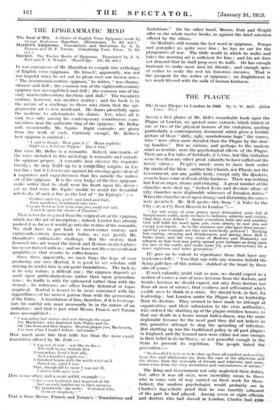THE EPIGRAMMATIC MIND .
The Soul of Wit. -A Choice of English Verse Epigrams made by George RostreVor Hamilton. (Heinemann. 7s. 6d.- net.)
Martial. The Twelve Books of -Epigrams. Translated by J. A. Pott and F. A. Wright. (Routhedge. 12s. 6d. net.)
IT • was courageous of Mr. Hamilton to compile this anthology of verse epigrams. He himself, apparently, was not too hopeful when lie set out to glean over, our barren acres. " The seventeenth-century epigram," he writes, " was clumsy, obscene and dull ; the common run of the eighteenth-century epigram was accomplished and dull ; • the common run of the early nineteenth-century facetious and dull." The•twentieth century, however, was another matter ; and his book is in the nature of a challenge to those who claim that the epi- grammatic art is now moribund. He draws plentifully upon the nuiderns to substantiate his claims. Yet, when all is said, two only among his contemporary contributors come anywhere near the authentic ring of the epigram : Mr. Belloe and-, occasionally, Mr. Squire. Eight examples are given from the work of each. Curiously enough, Mr. Bclloc's best epigram is omitted :— - " I said to Heart, ' How goes it ? ' Heart replied : Right as a Ribstone. Pippin.' But it lied." But even -Mr. Belloc is- a romantic. Indeed, nine-tenths of the verse included in this anthology is romantic and outside Ilw epigram proper. A romantic may observe the requisite brevity ; he may build up. to a compelling surprise in Vac . last line ; but it is ten to one against his steering.quite clear of vagueness and suggestiveness that lies outside the native art of the epigram. It is the very badge of the true epigram- matic writer that he shall wear his heart upon his sleeve ; yet we -find even Mr. Squire unable to avoid the beautiful nebulosity of such a line as the last of " An Epitaph "
" and shy, gentle and kind and frail, Poor wanderer, bewildered into vice, You are freed at, last from seas you could not sail, A wreck upon the shores of Paradise."
That is too far removed from the original art of the epigram, which was the art of inscription ; •indeed,•Landor had already pushed it as far as it would go into the realms of the romantic. We shall have to get back to street-corner oratory and eighteenth-century tavern-wit before • we • can justify Mr. nonillion's enthusiastic challenge. But the oratory that flowered into art round the Greek and Roman market-places has never thrived with us ; and we have not the conversational sprightliness that resorts -to coffee-houses.
Since, then, apparently, we must forgo, the hope of ever producing our own Martial, it is good to see scholars still striving to render him in adequate translations. The task is, in its very nature, a difficult one ; the epigram depends so • much upon particalarizations rather than upon generaliza- tions ; its traffic is with the ephemeral rather than with the eternal ; its references are often locally historical or topo- s,raphical. Martial is bound to be more concerned with the niggardliness of his newest patron than with the perversities
of the Fates. A translation-of him; therefore, if it is to recan.-
tore his careful wit, must necessarily be in the nature of an imitation ; and that is just what Messrs. Francis and Tatum have accomplished :-
" I was ailing last winter and sent through the snow,
For Mackenzie, who hastened with Fisher and Co.
Oh ! the frost and their fingers. Heaven, plague you, Mackenzie, I've now what I hadn't before—influenzie."
How much more • bite that trifle has than the more exact translation offered 'by Mr. Pott
" I was out of sort; —not like to die--
Till swift to my bedside flew Spumechug, fever's best ally, And a hundred pupils too ; A hundred hands with the north-wind chI3 Pawed me, until I vow
That, though till he came i was•not -ill, •
I shiver with ague now."
here is one other, and a more artful, example :-
Chloe seven husbands had deprived of life Ana on each tombstone to their.memory. ' My handiwork,' she wrote. 0 wicked wile, 0 sweet simplicity ! "
That is from Messrs. Francis and Tatum's -"-Translations and Imitations." On the other hand, Messrs. Pott and Wright -offer usthe whole twelVe bOoks, as against the brief-Selection 'offered by the Others.
- So Mai-tied-I still remain the-last word-in epigrams: • Pomps
.
and ParuiplieS • go 'quite:over him ; • he has no :ear for the -plangericies of war. The little world in which he walks and 'takes the morning air is sufficient for him ; and his art does not demandthat he shall peep over its walls. - has enough -bmilornie to • make most -men his friends ; and enough: spice of malice to make the rest his timorous enemies.- -That is the passport for the -writer of epigrams ; an:Englishman is too much blessed with the milk of.human kindness.














































 Previous page
Previous page